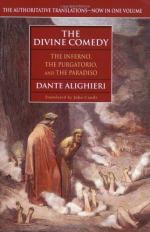So on she pass’d; and had not set, I ween,
Her tenth step to the ground, when with mine eyes
Her eyes encounter’d; and, with visage mild,
“So mend thy pace,” she cried, “that
if my words
Address thee, thou mayst still be aptly plac’d
To hear them.” Soon as duly to her side
I now had hasten’d: “Brother!”
she began,
“Why mak’st thou no attempt at questioning,
As thus we walk together?” Like to those
Who, speaking with too reverent an awe
Before their betters, draw not forth the voice
Alive unto their lips, befell me shell
That I in sounds imperfect thus began:
“Lady! what I have need of, that thou know’st,
And what will suit my need.” She answering
thus:
“Of fearfulness and shame, I will, that thou
Henceforth do rid thee: that thou speak no more,
As one who dreams. Thus far be taught of me:
The vessel, which thou saw’st the serpent break,
Was and is not: let him, who hath the blame,
Hope not to scare God’s vengeance with a sop.
Without an heir for ever shall not be
That eagle, he, who left the chariot plum’d,
Which monster made it first and next a prey.
Plainly I view, and therefore speak, the stars
E’en now approaching, whose conjunction, free
From all impediment and bar, brings on
A season, in the which, one sent from God,
(Five hundred, five, and ten, do mark him out)
That foul one, and th’ accomplice of her guilt,
The giant, both shall slay. And if perchance
My saying, dark as Themis or as Sphinx,
Fail to persuade thee, (since like them it foils
The intellect with blindness) yet ere long
Events shall be the Naiads, that will solve
This knotty riddle, and no damage light
On flock or field. Take heed; and as these words
By me are utter’d, teach them even so
To those who live that life, which is a race
To death: and when thou writ’st them, keep
in mind
Not to conceal how thou hast seen the plant,
That twice hath now been spoil’d. This
whoso robs,
This whoso plucks, with blasphemy of deed
Sins against God, who for his use alone
Creating hallow’d it. For taste of this,
In pain and in desire, five thousand years
And upward, the first soul did yearn for him,
Who punish’d in himself the fatal gust.
“Thy reason slumbers, if it deem this height
And summit thus inverted of the plant,
Without due cause: and were not vainer thoughts,
As Elsa’s numbing waters, to thy soul,
And their fond pleasures had not dyed it dark
As Pyramus the mulberry, thou hadst seen,
In such momentous circumstance alone,
God’s equal justice morally implied
In the forbidden tree. But since I mark thee
In understanding harden’d into stone,
And, to that hardness, spotted too and stain’d,
So that thine eye is dazzled at my word,
I will, that, if not written, yet at least
Painted thou take it in thee, for the cause,
That one brings home his staff inwreath’d with
palm.”




